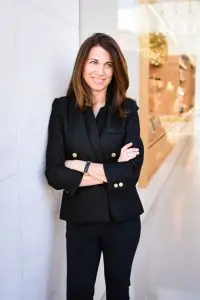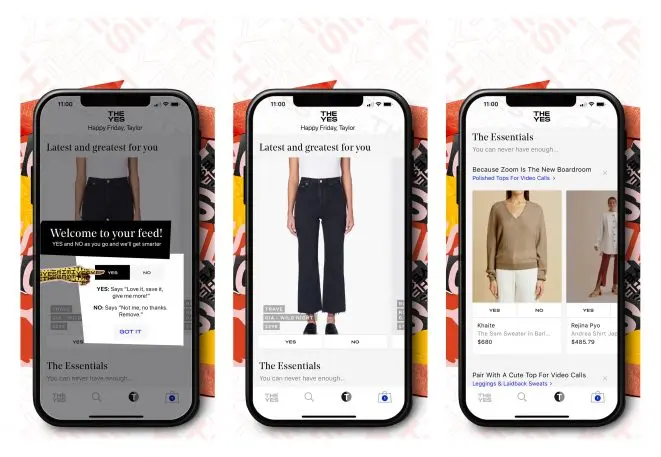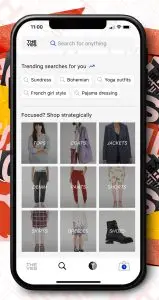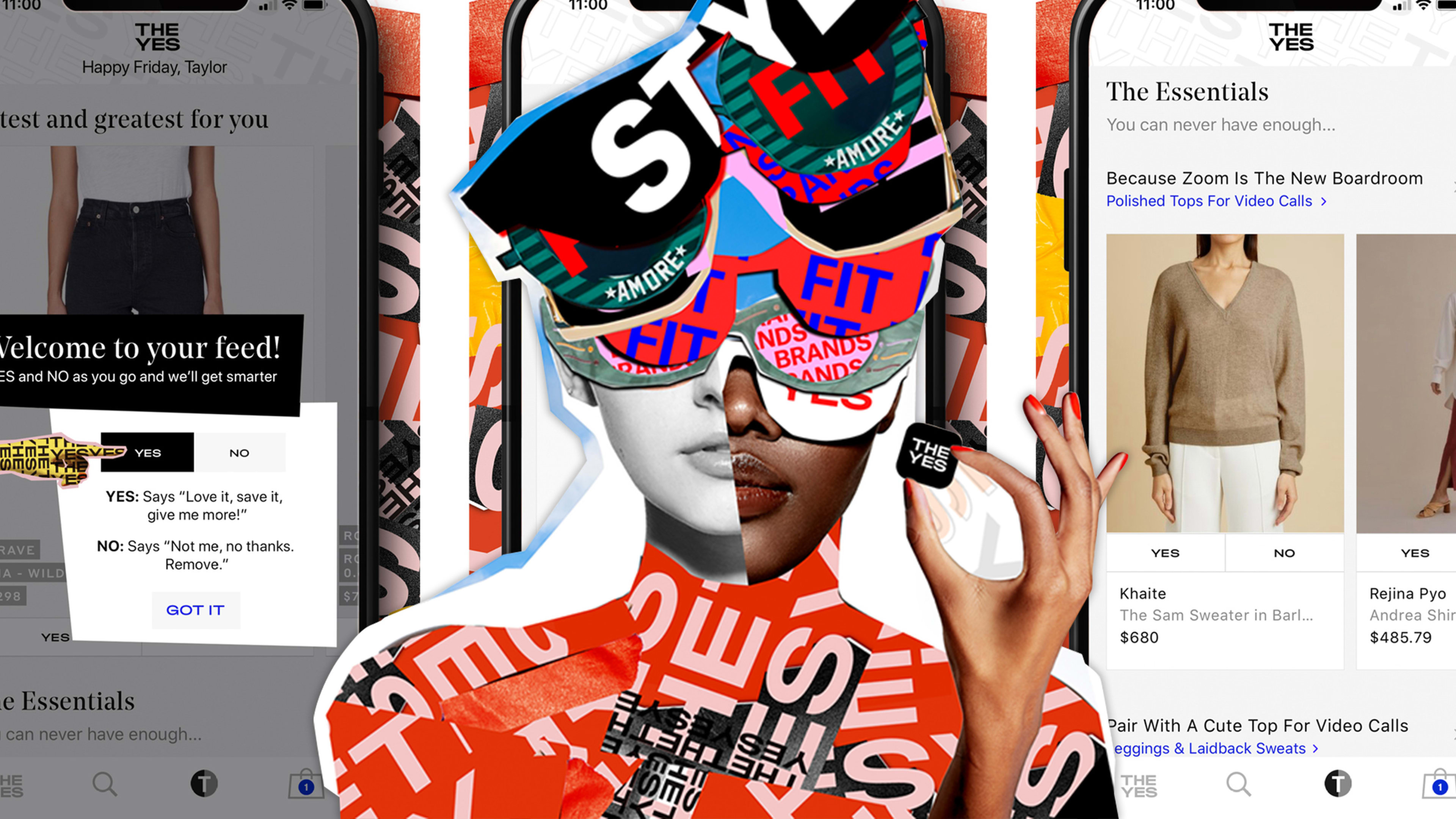Department stores have been on the decline for years, and now that the pandemic has emptied brick-and-mortar stores, they may die out entirely. But the concept of being able to easily browse different brands and products still resonates with many shoppers. A new app called The Yes is built to be a virtual department store.

“Department stores were the love of my life,” says Julie Bornstein, who has spent 20 years leading top retail brands. “I loved going to the mall every weekend growing up. In my mind, we’re creating the department store of the future.”
In many ways, The Yes takes a page from the Spotify or Netflix playbook: It offers recommendations that are tailored to your preferences. You start by taking a quick survey about your style, then the algorithm uses AI and machine learning to identify your aesthetic preferences, from your favorite colors to your profound hatred of off-the-shoulder dresses. Then, the app scans through products from 150 fashion brands (and counting) ranging from Madewell to Dolce & Gabbana to suggest products you might be interested in. This means that a pair of $650 Gucci espadrilles might be next to a similar looking $79 pair from & Other Stories. If you want, you have the option of clicking “yes” or “no” when you see a product, which will help the algorithm better understand your taste.

Bornstein points out that the rise of direct-to-consumer brands means that many customers tend to gravitate toward a set of brands they like, so they don’t have the same opportunities to explore other brands and aesthetics as they might in a brick-and-mortar department store. “Discovery is an important part of the platform,” says Bornstein. “We want to introduce you to new styles and new products that you may not have encountered otherwise.”

From there, the app aims to make shopping easy. All products come with free shipping, paid for by the brand, and you can pay with a single click using your ApplePay account information. The Yes serves as a middleman, taking a cut of the brand’s revenue. (Bornstein declined to say what percentage it takes, but said it is less than what brands pay department stores.) The Yes doesn’t buy or own inventory; instead, when a customer makes a purchase, the brand sends it directly to them. The Yes also uses a brand’s own imagery, so it doesn’t have to pay to shoot all the products on its own models, the way many department stores do. “We found that brands like this because it allows them to maintain control of their own image,” says Bornstein. “They can style product in the way they like.”
I tested an early version of the app last week (and even bought a pair of Edie Parker earrings). I found that the app was good at quickly identifying what I didn’t like: For instance, I’m not a fan of swimsuits with large cutouts in the middle or wide-legged jeans. But it didn’t always nail what I did like. The app organized outfits according to a few themes, such as “essentials” and “nautical-inspired outfits,” and sometimes I found looks I really liked; other times, I didn’t care for the aesthetic at all.
What was intriguing is that the app led me to styles that I wouldn’t gravitate toward ordinarily—like paperbag shorts or floral midi skirts—but after seeing them styled by various brands, I started finding them appealing. The Yes shows products across many price points, but you can choose to filter items based on their cost. “The high-low aspect of the app is very important,” Bornstein says. “Customers like to see the full spectrum of options.”
However, this approach carries some risk as well, particularly to high-end designers. Some customers might see two products that are very similar and choose to buy the cheaper option. And others might be put off seeing a high-end designer next to a mass-market brand.
Bornstein cofounded the company with Amit Aggarwal, who has two decades of experience at early search engine companies such as Google and Bing. Many multi-brand e-commerce sites like Amazon use product recommendation engines that suggest products based on the customer’s previous purchases and items they click on. “This is why I keep getting recommendations for men’s shirts because I searched for a shirt for my husband,” Bornstein says.
Instead, Aggarwal, Bornstein, and The Yes’s head of fashion, Taylor Tomasi Hill, created a taxonomy that breaks down every aspect of a garment—from its length to the pattern on it to its color palette and more—to understand what customer likes. Then it uses computer vision technology to scan through a brand’s collection and suggest items customers might like.
As I was scanning through the app, I found several brands that are known from their direct-to-consumer business model, including Everlane and Cuyana, which ordinarily don’t sell products on multi-brand platforms, like department stores. At the same time, they are able to maintain some control of their own branding, such as using their own imagery and sending products to customers in their own packaging.
The Yes is a fresh approach to shopping, but it does have an uphill battle ahead trying to change consumer behavior. The company will need to convince customers to download yet another app on their already overcrowded phones. And The Yes does not have control over the quality of the merchandise or the shipping logistics, but customers are likely to hold it responsible for any mishaps that happen if their product shows up damaged or late.
Bornstein says that ultimately The Yes wants to help brands find new customers, even if it means that some shoppers leave The Yes to shop directly from a brand’s website. She believes that those customers will come back to The Yes, because it offers more variety than a single brand. “You went to a department store because it offered something different from going to a brand’s own store,” says Bornstein. “Our thesis is that the same is true in the digital world. There’s always going to be room for a multi-brand experience, as long as it’s a fun, seamless one.”
Recognize your brand’s excellence by applying to this year’s Brands That Matter Awards before the early-rate deadline, May 3.
